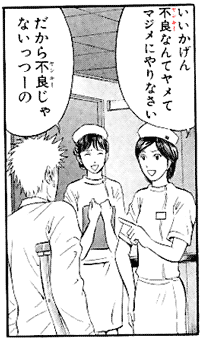In Japanese, yankii ヤンキー means "delinquent," furyou 不良, most of the time. The term is a katakanization of "yankee," which means a person from the United States. It also refers to a fashion style associated with delinquents.
Definition
The original meaning of yankii ヤンキー is really "yankee," a way to refer to a person from the USA, however, the term also refers to a "juvenile delinquent" in Japanese.(デジタル大辞泉)
- Context: a guy leaves the hospital after being hospitalized after a street fight. A nurse gives him advice.
- ii-kagen
furyou (yankii) nante yamete
{majime ni} yarinasai
いいかげん不良なんてヤメてマジメにやりなさい
For crying out loud, stop being a delinquent and [act] {seriously}.- Here, yankii is used as a gikun reading for furyou, which means "delinquent."
- She assumes he's a delinquent since he was in a fight.
- yaru やる - to do [things], to conduct oneself somehow.
- dakara furyou (yankii) janai ttsuu no
だから不良じゃないっつーの
[Like I said already], I'm not a delinquent.- ttsuu no - contraction of to itte-iru no と言っているの.
Note that yankee only means delinquent in Japanese, not in English. That is, it's a loan-word that gained an added meaning in Japanese, a wasei-gairaigo 和製外来語.
One must wonder, then, why does yankee mean delinquent in Japanese? What one thing has to do with the other? Where does this second meaning of yankii come from?
Origin
After the second world war, Japanese teenagers became influenced by western fashion, and did things like dying their hair blond.
The term yankii started being used to refer to these youngsters that dyed their hair blond, mainly in the Kansai 関西 region.(日本国語大辞典)
Specifically:(不良とヤンキーの違い..., oshiete.goo.ne.jp)
- yankii wa furyou no sutairu no koto desu
ヤンキーは不良のスタイルの事です。
Yankee [refers] to a style of delinquent. - {Yokohama no furyou ga beihei no sutairu wo manete riizento, kawa-jan, tabotabo no zubon wo haita} no wo "Yokohama yankii" to iimashita.
横浜の不良が米兵のスタイルを真似てリーゼント、革ジャン、ダボダボのズボンをはいたのを「横浜ヤンキー」と言いました。
When {the delinquents of Yokohama, copying the style of American soldiers, worn pompadour (regent hairstyle), leather jackets, and loose pants}, [this] was called "Yokohama yankee.". - {sore ga Oosaka ni haitte, {{iro-shatsu ya onna-mono no sandaru ya} to itta} chinpira fasshon to awasatta} no ga "Oosaka yankii" desu.
それが大阪に入って、色シャツや女物のサンダルやといったチンピラファッションと合わさったのが「大阪ヤンキー」です。
When {that entered Osaka, combining with {{colored shirts, and women's sandals}, the so-called} hooligan fashion}, it [was called] "Osaka yankee."- chinpira
チンピラ
Hooligan. Delinquent.
Low-ranking gang member, yakuza ヤクザ.
- chinpira
In other words, originally yankii referred only to one type of delinquent, the type that wore the yankee style, to differentiate from those that didn't. Nowadays, they're no longer differentiated, and yankii just refers to delinquents in general.(不良とヤンキーの違い..., oshiete.goo.ne.jp)
Some examples of characters with similar styles include:
- Urameshi Yusuke 浦飯幽助, from Yu Yu Hakusho 幽☆遊☆白書.
- Hijikata Josuke 東方定助, from JoJo no Kimyou na Bouken ジョジョの奇妙な冒険.
Related Terms
The term moto-yan 元ヤン is an abbreviation of moto-yankii 元ヤンキー, meaning "former delinquent," "ex-delinquent."
The term yankii-zuwari ヤンキー座り refers to the way delinquents squat.
The term yancha やんちゃ refers to a troublesome kid, who doesn't listen to what adults says and keeps doing pranks. A brat. It has nothing to do with yankii, despite sounding similar.
References
- ヤンキー - 精選版 日本国語大辞典 via kotobank.jp, accessed 2021-03-29.
- ヤンキー - デジタル大辞泉 via kotobank.jp, accessed 2021-03-29.
- 不良とヤンキーの違いって何ですか。 - oshiete.goo.ne.jp, accessed 2021-03-29.


No comments: